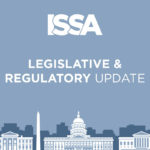News
ISSA LARU—ISSA Endorses Bill for Menstrual Product Access
July 14, 2023
Welcome to the latest ISSA Legislative & Regulatory Update, a biweekly roundup of the public-policy issues currently impacting the full cleaning-supply chain. This update touches on ISSA supporting a bill to expand access to menstrual-care products, the latest accomplishments of implementing PRIA 5, a Workplace Solution Association survey for small businesses, and more.
Want to stay informed about critical government affairs impacting the industry? Sign up here to have the ISSA Legislative & Regulatory Update emailed directly to you every other week.
ISSA Advocacy
ISSA Endorses Bill to Expand Access to Menstrual Products
ISSA endorsed the Period PROUD (Providing Resources to Our Underserved and Disadvantaged) Act of 2023 that was introduced last week by U.S. Representatives Sean Casten (IL-06) and Grace Meng (NY-06). The legislation would expand accessibility to menstrual products for those with limited access. Specifically, the Period PROUD Act would provide funding through the Social Services Block Grant program to remove cost barriers to menstrual products and educate school officials on how best to communicate with students in need of these products. Learn more
EPA, ISSA: Latest Pesticide Registration Improvement Act Accomplishments
The U.S. Environmental Protection Agency (EPA), along with ISSA, announced accomplishments achieved during the first half of 2023 for the implementation of the Pesticide Registration Improvement Act (PRIA 5), which ISSA strongly supported. The EPA also announced upcoming related activities projected for completion by December 2023. Learn more`
Help Support Small Businesses through This Short Survey
As a small business owner, your insights and experience are crucial in shaping the support that the Workplace Solutions Association (WSA), Powered by ISSA provides to small businesses. Congress made it easier for small businesses to qualify and receive Economic Injury Disaster Loans (EIDL) during the COVID-19 pandemic. However, many small businesses still struggle, especially with repaying these loans. To find a solution and educate Congress on the impact, we need your help. Please take a moment to complete a short survey that will provide valuable insights into the challenges faced by small businesses with outstanding EIDL loans. Together, we can help small business owners with their business recovery. Take the survey now
Legislative
Senators Reintroduce Bipartisan Bill to Address Rail Service
Senators Tammy Baldwin (D-WI) and Roger Marshall (R-KS) introduced the Reliable Rail Service Act, which seeks to clarify the definition of railroads’ common carrier obligation and establish specific criteria for the U.S. Surface Transportation Board to consider when determining if a railroad has violated that obligation, Trains reported. Learn more
Regulatory
EPA Closes out Specific Antimicrobial Notification Actions
The U.S. Environmental Protection Agency (EPA) announced a new effort to close out notifications of minor pesticide-label or product-formulation changes in an effort to reduce the backlog, which will “allow EPA to focus its limited resources on addressing higher priority actions.” Learn more
SBA Alleges $200B Stolen in COVID-19 Relief
More than US$200 billion in COVID-19 relief loans and grants for small businesses may have been stolen, according to the U.S. Small Business Administration (SBA) and Cleaning & Maintenance Management. The SBA report marks the highest estimate yet in the administration’s ongoing investigation into federally-funded programs that helped small-business owners and entrepreneurs in the wake of the pandemic. Learn more
State News
Minimum-Wage Workers in These States, Localities Just Received Raise
Many low-wage workers just received a boost in pay, as more than a dozen states and localities increased their minimum wages, CNN reported. Many of the boosts are automatic adjustments linked to inflation. The raises are larger than they have been historically because of higher prices. In Connecticut and Nevada, lawmakers passed scheduled increases in 2019. Learn more





